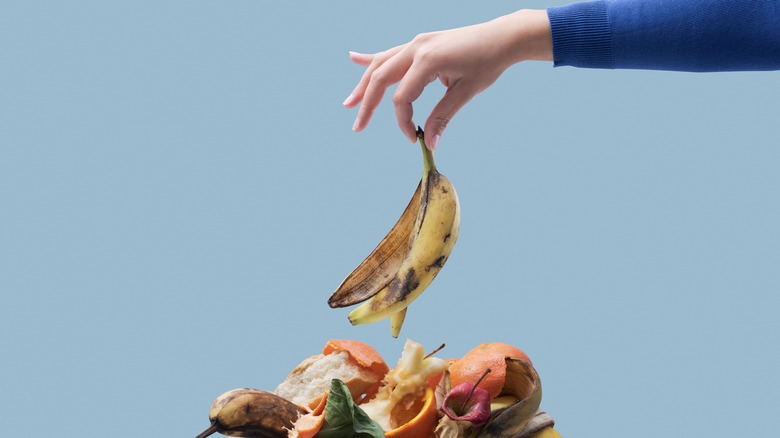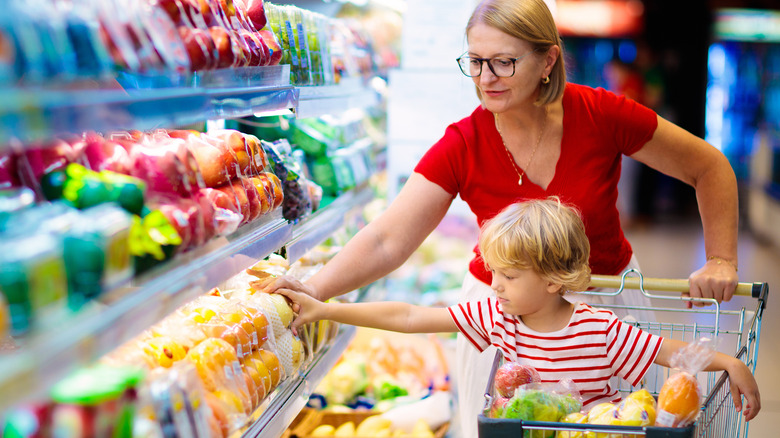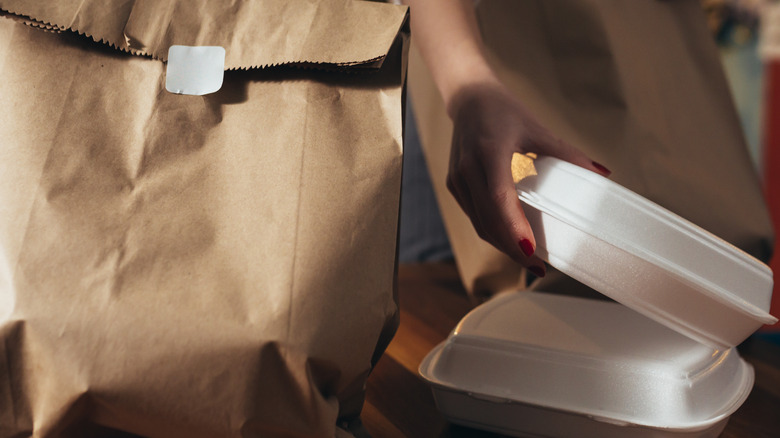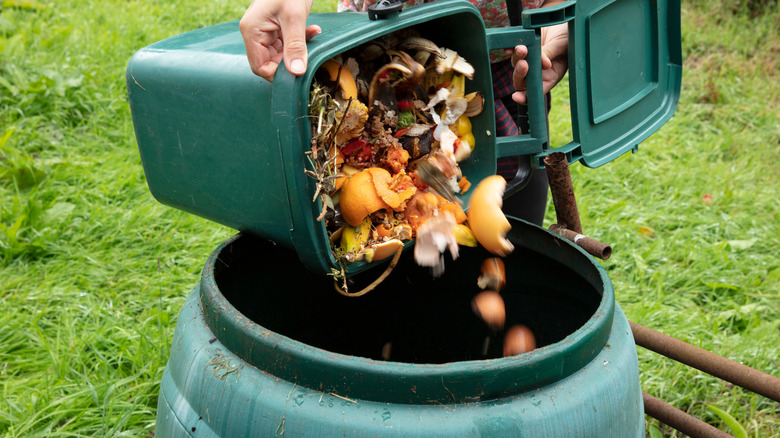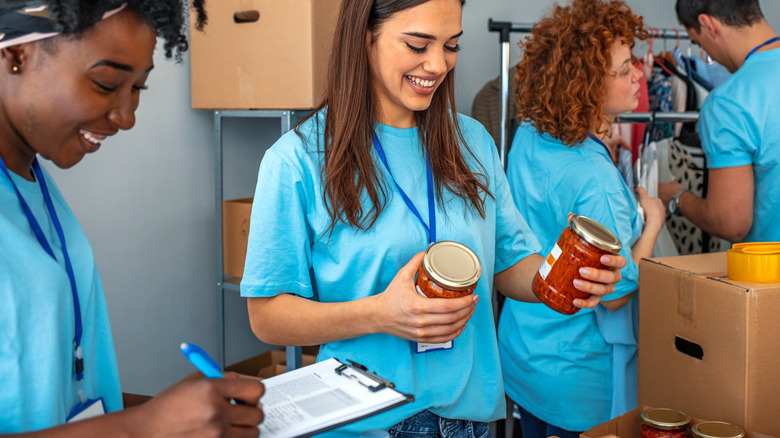The UN's Advice For Minimizing Food Waste
September 29 was the International Day of Awareness of Food Loss and Waste. And if you weren't aware, the United Nations says that approximately 17% of food is wasted by retailers and consumers. That's globally. The United States alone wastes 40% of its food, according to Feeding America. With the UN stating that 830 million people are going hungry every day worldwide, that's a staggering statistic. The UN also says that 14% of food is lost after harvest before it even gets to shops. Numbers like this can seem daunting, even paralyzing. But awareness is the beginning of change. Many organizations have set out to stop food loss and waste, and the UN has gathered some tips for consumers.
Waste 4 Change says there's an important difference between the concepts of "food loss" and "food waste." They describe food loss as occurring at the beginning of the food chain when food is being produced or harvested, due to natural disasters, accidents, or choices made by food suppliers. On the other hand, "food waste" occurs at the end of the food chain when it's in the hands of retailers and consumers, happening due to damage, expiration, and being discarded. While organizations play a huge part in food waste minimization, and the Food and Agriculture Organization of the United Nations has implemented several projects, individuals can do their part too.
Shop smart
When shopping, consider buying what the industry considers "seconds." Seconds are foods that aren't perfect — misshapen or discolored (per Michigan State University). You can even save money this way — often, produce is marked down for "quick sale" simply because the store is trying to move out seasonal items or overripe bananas (via All Recipes). The Mayo Clinic encourages people to buy what's considered "ugly food," or food that doesn't look perfect but still tastes great. Companies like Misfits Market and others have arisen to sell food at a discount that would otherwise go to waste. There are also many discount grocery stores that sell rejects from major stores like damaged cans and boxes.
The UN also recommends "shopping smart." That means not buying more than we can eat before it goes bad. That Costco-sized tub of mixed greens may seem smart, but mixed greens rot quickly and you may end up tossing the same amount you saved (via Insider). Shopping smart also means checking your refrigerator. Is it set to the proper temperature? Is it packed too full? Over-stuffing your fridge could mean it can't properly cool, letting food spoil too soon (via MRG Apartments).
Don't order more than you can eat
Distributors aren't the only ones to blame for throwing away food. Restaurants carry responsibility too. Food Print explains that restaurants throw away 4–10% of their food before it even reaches diners. But, diners can also decrease their food waste. The UN suggests when ordering out, not to order more than you can eat. Restaurant portions have increased dramatically over the years (via Food Print), so diners could consider splitting a meal. That saves on your wallet too!
If you don't finish your meal out, taking home a "doggy bag" doesn't mean you have to simply reheat leftovers (or feed your dog). Try turning it into a new meal, suggests Taste of Home. Thinly slice leftover steak and simmer it in broth and seasonings to add to a vegetable dish or rice. Roasted or fresh veggies can be added to soups or reheated and grilled. Or what about a casserole? Spoon University suggests turning Chinese into Mexican by putting your orange chicken leftovers in a tortilla.
Composting is easier than you think
Remember, food itself is never a waste, the UN says. With simple and sustainable practices like converting food to compost or repurposing leftovers, individuals and families can practice their own discipline in raising awareness and making a difference.
When food scraps are thrown away, they can release methane gas into the atmosphere, exacerbating global warming (via Washington Post). Not to mention the high cost in processing solid waste ($55 per ton in 2019, according to the National Resources Defense Council). But, when food is composted, it decomposes, allowing its nutrients to go back into the ground and creating a rich soil. This can be used as fertilizer for gardens, farms, and flowerbeds.
Composting isn't as hard as you think. Urban dwellers and land owners alike can participate in re-purposing scraps for compost. Simply mix your organic scraps (not meat) with paper or leaves and a little water. Mix and stir regularly. Eventually you can put it in your backyard as it ages, the Washington Post explains.
Donate unused food
Donating food is always a great option. Food banks rescue food and then distribute it to food pantries and charities (via Midwest Food Bank). There are over 350 food banks worldwide, Food Bank News claims, all trying to minimize loss and waste in the middle of the food chain — hoping to get supplies into the hands of hungry people. Obviously unopened food like pasta, canned goods, and bags of rice are readily donatable, but what about partially consumed or opened containers of food? Many vacation rentals partner with their local food pantries to salvage food that tourists leave behind — even perishable and opened packages (via A Second Helping).
Knowing what "best by" or "use by" and other labels on food mean is another sure way to minimize waste. According to the United Nations, "use by" is truly an expiration date and should not be eaten after that date. But "best by" can still be consumed after the date if it was stored well. "Sell by" and "use by" are not federally regulated and are only used by the food manufacturer (via Food Print).
The UN continues to push for good governance and educational programs worldwide, declaring days of awareness like the one on September 29 to put a dent in this vicious cycle. More tips for how people can become what they call a "food hero" are available to download on their webpage.
